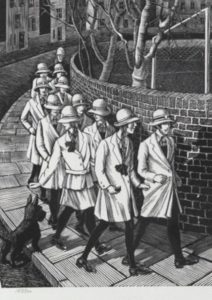
Scooterons-nous vite. It’s Back to School with Angela Brazil
Long before Harry Potter – and indeed long before all those school story authors who gave us Malory Towers and St. Clare’s and the Chalet School and the Abbey School and Jennings and Billy Bunter – there was Angela Brazil. Brazil – rhymes with dazzle – didn’t invent the school story but she gave it new and distinct extended life.
After I had exhausted all acceptable (to me) alternatives in the local children’s library my mother mentioned that she had read Brazil’s books as a child and Lo! – thank you Swindon Public Libraries – they had not been purged or culled or otherwise trashed and were on the shelves ready to be taken home.
There was an annoying limit of two fiction and one non fiction per visit but that meant I could still read four a week. This must have been when I was about 10 and before homework came along to eat into reading time.
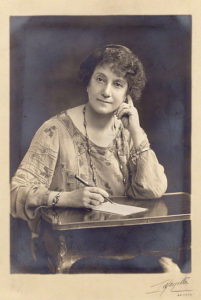
Brazil’s novels were wonderfully old-fashioned and outdated even then and indeed would have been when my mother read them. Brazil’s first novel was published in 1904.
I spent some time this summer reading several and skimming others. I started with A Pair of School Girls (1912) Then – just intending to dip into a couple more – I found myself drawn in. The Leader of the Lower School (1913), The School by the Sea (1914), For the Sake of the School (1915), The Madcap of the School (1917), A Patriotic Schoolgirl (1918), For the School Colours (1918), and Loyal to the School (1921) followed
These are all available to read for free on Gutenberg.
Yes – the plots are predictable and formulaic, the class attitudes and the occasional – oh! so casual – snippets of racism jarring. The attitudes are of a piece with the English middle classes of their time with an extra slice of Brazil brand snobbery thrown in.
Brazil asserted that her name rhymed with dazzle but it seems that other members of the family were happy with sounding it like the country. Shades of Keeping up Appearances and Hyacinth Bucket – the BritCom social climber – who insists that her surname is pronounced “Bouquet”
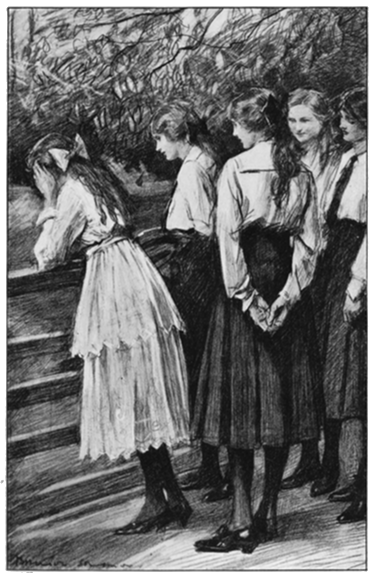
The focus is a girl or girls usually between 14 and 15 who for some reason must be sent to school.
Fathers are often absent, distant, distracted or dead and there is often someone who is respectable but in straitened circumstances. Mothers are mostly benign, and out of the main frame.
The girls are invariably cheerful, resilient, resourceful, plucky and smart, but not too clever. They are not particularly rich or privileged. They play pranks but they don’t blab and they don’t blub:
“What are you making such a hullabaloo about? You’re the limit this evening. Do, for goodness’ sake, brace up!”
There are snobs and sneaks and tribal expectations and norms. New girls and swots need to be put in their place. Girls who put on airs must be pulled down a peg or two and super clever genius girls need to learn not to set the standard too high for the rest of the chums. It’s a kind of community spirit that even the teachers help to maintain.
At Marlowe Grange for example, two new girls are causing all kinds of problems. One is a swank and the other a genius prig. Something needs to be done. Fortunately, the madcap of the school – Raymonde – and her chums are up to the task;
“D’you know,” said Morvyth, flopping down disgustedly on to a form, and addressing an interested audience of three; “d’you know, my children, that I consider these two new girls the very limit?”
“Absolute blighters!” agreed Raymonde hastily, “I was thinking so myself only this morning. I can’t decide which is the worst.”
“Not a pin to choose between them!” commented Aveline with a yawn.
“I gave Cynthia Greene credit for shyness during the first twenty-four hours,” continued Morvyth. “I thought in my own mind, ‘the poor thing is suffering, no doubt, from home-sickness and general confusion, and we must be gentle with her’, but I kept a wary eye upon her, and I’ve come to a conclusion. It’s not shyness—it’s swank!”
Ardiune nodded her head approvingly.
“Swank, and nothing else,” she confirmed. “I know something about it too, for I heard her expounding to her own Form this morning. It almost made me ill. I had to take a run round the garden before I felt fit again. It seems she’s come from some much smaller school, where she’s been the head girl and show pupil, and the rest of it. She said the younger ones had all looked up to her, and the Principal had treated her as a friend, and that she’d always worked hard to keep up the tone of the place.”
“O Sophonisba!” ejaculated Raymonde. “Well, it strikes me we’ve got the tone of this school to look after. We can’t allow Fourth Form kids to bring those notions and run them here. She won’t find herself queen of this establishment!”
“Hardly!” chuckled Aveline.
“Aren’t her own Form attending to the matter?” enquired Morvyth.
“Naturally. They’re giving her as bad a time as they know how, but they don’t make much headway. She tells them she fully expects to be ragged, and she simply won’t believe a word they say. They haven’t taken her in once yet.”
“That’s because they’re not skilful,” said Raymonde thoughtfully. “They don’t do the thing artistically. There’s a finesse required for this kind of work that their stupid young heads don’t possess. I’m not sure if it wouldn’t be philanthropic to help them!”
“Set your own house in order first!” grunted Ardiune. “You’ll have your hands full with Maudie Heywood.”
“I’m not going to neglect Maudie; don’t alarm yourself! She’s the best specimen of the genus prig that I’ve ever come across in the course of my life. She ought to have a Form all to herself, instead of being plumped into the Fifth. I see dangerous possibilities in Maudie. Do you realize what she did this morning? Learnt the whole of that wretched poem instead of only the twenty lines that were set us.”
“I heard Gibbie complimenting her, and thought she’d get swelled head.”
“Swelled head indeed! It’s the principle that’s involved. Don’t you see that if this girl goes and learns whole poems, Gibbie’ll think we can do the same, and she’ll give us more next time. It’s raising the standard of work in the Form.”
“Great Minerva! So it is!”
“We’ll have to put a stopper on that,” urged Aveline indignantly.
“There are a good many things that have given me spasms since I came back,” proclaimed Raymonde. “They’re things that ought to be set right. What I vote is, that our set form ourselves into a sort of Watch Committee to attend to any little matters of this sort. It would be a kindness to the school.” The Madcap of the School (1917)
And so the chums set about putting matters to rights. Raymonde deceives Cynthia into making a fool of herself. And so to the Maudie problem:
“The fact is,” burst out Aveline, “you’re suffering from an over-developed conscience. You’ve got an abnormal appetite for work, and it ought to be checked. It isn’t good for you. Promise us you won’t write or learn a word out of prep. time.”
Maudie shook her head sadly. Her grey eyes gleamed with the enthusiasm of the martyr spirit.
“I can’t promise anything,” she sighed. “Something within me urges me to work.”
“Then something without you will have to put a stop to it,” snapped Raymonde.
After Maudie refuses to buckle to peer pressure to modify her work habits and after this fair warning her desk lid is sealed shut with the help of cobblers’ wax, a spirit-lamp and curling tongs. It’s all a bit brutal.
And how does the head of school respond to this egregious piece of vandalism and bullying?
There is something very lovable about Raymonde
A quarter of an hour later, Miss Beasley and Miss Gibbs were sitting together in the Principal’s study enjoying a well-earned period of repose and a chat. Their conversation turned upon the varied dispositions of their pupils.
“Maudie Heywood strikes me as a very earnest character,” observed Miss Beasley, toying with the violets in her belt. “Her work is really excellent.”
“Almost too good,” agreed Miss Gibbs, who was perhaps beginning to find out that Maudie’s exercises took twice as long to correct as anybody else’s, and thus sensibly curtailed her teacher’s leisure. “The child is so conscientious. In my opinion she needs to concentrate more on physical exercise. I should like to see her in the tennis courts instead of copying out reams of poetry.”
“Yes,” said Miss Beasley, looking thoughtful. “Her activities perhaps need a little adjustment. We mustn’t allow her to neglect her health. She looks over-anxious sometimes for a girl of fifteen.”
“She is always such a calm, self-controlled, well-regulated child,” remarked Miss Gibbs appreciatively.
At that moment there was a hurried rap-tap-tap; the door opened, and Maudie burst in unannounced. Her calm self-control had yielded to an agitated condition of excitement and indignation. Her earnest eyes were flashing angry sparks, and her cheeks were crimson.
“Oh, Miss Beasley!” she began, “those girls have actually gone and stuck up my desk, so that I can’t get out my books. They say I work overtime, and it’s not fair, for if I like to work, why shouldn’t I? I just detest the whole lot of them! I hate this place!”
“I think you’re forgetting yourself, Maudie,” returned the Principal. “It is hardly good manners to enter my study so abruptly and to speak in this way to me. If you wish to please me, I should much prefer you to spend your leisure time at games instead of lessons. To-morrow evening I hope to see you playing tennis. If you ask the cook for a screw-driver you’ll probably be able to wedge open your desk easily. But in future you’ll be wiser to confine your work to the preparation hours. The bow must be unstrung sometimes, or your health will suffer. If you join with the other girls at their games you’ll soon get to know them, and feel more at home here. Try to be sociable and make yourself liked. Part of the training of school life is to learn to accommodate yourself to a community.”
The crestfallen Maudie retired, murmuring apologies. Miss Beasley picked up her copy of The Graphic and laughed.
“As a rule, we may trust the girls themselves to do any necessary pruning. They’re the strictest Socialists that could be imagined. They instinctively have all the principles of a trade union about them. On the whole, it’s good for Maudie to be restrained. A little innocent practical joke will do her no harm for once. She must be able to take her share of teasing. Humour is her one deficiency.”
“I think I can guess who’s at the bottom of the business,” sniffed Miss Gibbs. “Raymonde Armitage is the naughtiest girl in the school.”
“Pardon me!” corrected Miss Beasley. “The most mischievous, perhaps, and the most troublesome; full of bubbling spirits and misplaced energy, but straightforward and truthful. There is something very lovable about Raymonde.” The Madcap of the School (1917)
Raymonde and her set of friends – the Mystic Seven – comprise a useful set of Brazil types and exotic names. She has a loyal understudy in Aveline and a worshipper in the helpless, hopeless Fauvette – ” a little, blue-eyed, fluffy-haired, clinging, cuddly, ultra-feminine specimen who hung on to Raymonde like a limpet.”
There’s Morvyth – the clever one – who keeps her intelligence below the school radar as best she can;
When she cared to work she could astonish her Form and her teacher, but her energy came in such odd bursts, and with such long lapses between, that it did not in the aggregate amount to much. It was rumoured in the school that Miss Beasley had her eye on Morvyth as a possible candidate for public examinations, and, in fear lest such an honour might be thrust upon her, Morvyth was careful to avoid the display of too deep erudition.
“It wouldn’t do,” she assured her chums. “Catch me swatting for the Senior Oxford like poor old Meta and Daphne. I tell you those girls will hardly enjoy a decent game of tennis this term. The Bumble Bee’s got their wretched noses on the grindstone, and they’ll have a blighting time till the affair’s over. No, I’m a wary bird, and I’m not going to be decoyed into an intellectual trap and dished up for examination.
Valentine and Ardiune are inseparable
in spite of the fact that they quarrelled on an average at least three times a day. Their tiffs were very easily made up, however, and they always supported each other in upsets with anyone else, merging what might be termed tribal disputes in national warfare. Being well supplied from home with chocolates, and liberal in their dispensation, they were favourites in their Form, and indeed throughout the school wore the hallmark of popularity.
And the seventh comrade Katherine – “a damsel whose demure looks belied her character. Katherine’s innocent grey eyes and doll-like complexion were the vineyards that hide the volcano. She could always be relied upon to support any enterprising project or interesting hoax that was presented for her approval.”
A classic Brazil novel creates a community largely free of adults, although there will be problems with teachers and misunderstandings There are secret rooms, and – in the WW1 era books – German spies, escaped prisoners-of-war and talk of Zeppelin raids. There’s adult surveillance to be evaded and authority to be subverted. There are creaky and predictable plot devices involving foundlings, lost relatives, train wrecks and hidden wills. There are tricks to be played and all kinds of dangers to be confronted. But pluck and ingenuity win out.
The schools are usually small – often with a score or so of students and the boarding schools are often situated in dramatic settings – on a clifftop, surrounded by a moat, on a moorland. Brazil was especially fond of Elizabethan manor houses. But there are large city day schools too.
Whatever the setting the conditions are usually spare and spartan. Windows are open at night whatever the weather and sometimes this means drifts of snow in the bedrooms in the morning.
The spring term at Brackenfield proved bitterly cold. In February the snow fell thickly, and one morning the school woke to find a white world. In Dormitory 9 matters were serious, for the snow had drifted in through the open window and covered everything like a winding-sheet. It was a new experience for the girls to see dressing-tables and wash-stands shrouded in white, and a drift in the middle of the floor. They set to work after breakfast with shovels and toiled away till nearly school-time before they had made a clearance.
“I feel like an Alpine traveller,” declared Chrissie. “If things go on at this rate the school will have to provide St. Bernard dogs to rescue us in the mornings.”
“The newspapers say it’s the worst frost since 1895,” remarked Sylvia.
“I think it’s the limit,” groused Betty. “Give me good open hunting weather. I hate snow.”
“Hockey’ll be off,” said Marjorie. “It’s a grizzly nuisance about the match on Saturday.”
…. At night, however, they suffered very much from the cold. Open bedroom windows were a cardinal rule, and, with the thermometer many degrees below zero, the less hardy found it almost impossible to keep warm. Marjorie, who was rather a chilly subject, lay awake night after night and shivered. It was true that hot bricks were allowed, but with so many beds to look after, the maids did not always bring them up at standard heat, and Marjorie’s half-frozen toes often found only lukewarm comfort. After enduring the misery for three nights, she boldly went to Mrs. Morrison and begged permission to be taken to Whitecliffe to buy an india-rubber hot-water bag, which she could herself fill in the bath-room. Part of the Empress’s success as a Principal was due to the fact that she was always ready to listen to any reasonable demands. Hers was no red-tape rule, but a system based on sensible methods. She smiled as Marjorie rather bashfully uttered her request.
“Fifteen other girls have asked me the same thing,” she replied. “You may all go into Whitecliffe this afternoon with Miss Duckworth, and see what you can find at the Stores.”
It is this trip to buy hot-water bottles that leads to a snowball fight with wounded soldiers episode – an egregious breach of decorum that lets down the good name of the school. They are all sent to the headmistress’s office to hear their fate:
They filed in like a row of prisoners. Mrs. Morrison marshalled them into a double line opposite her desk, then, standing so as to command the eyes of all, she opened the vials of her wrath. She reproached them for unladylike conduct, loss of dignity, and lack of discipline.
“Where are the traditions of Brackenfield,” she asked, “if you can so far forget yourselves as to descend to such behaviour? One would imagine you were poor ignorant girls who had never been taught better; indeed, many a Sunday-school class would have had more self-respect. Whoever began it”—here she looked hard at Marjorie—”is directly responsible for lowering the tone of the school. Think what disgrace it brings on the name of Brackenfield for such an act to be remembered against her pupils! Knit and sew for the soldiers, get up concerts for them, and speak kindly to them in the hospitals, but never for a moment forget in your conduct what is due both to yourself and to them. This afternoon’s occurrence has grieved me more than I can express. I had believed that I could trust you, but I find to my sorrow that I was mistaken.“
Poor, well-intentioned, patriotic Marjorie has a further dose of headmistressy wrath ahead of her before all is resolved.
The school heads are generally strict and fair but with a crisis precipitating habit of jumping to false conclusions. They take their work seriously and it’s clear that Brazil did her education research. They inspire awe, respect and indignation in equal measure. The curriculum is rather progressive, or in the process of changing.
There are several stories written and set during WW1 A Patriotic School Girl for instance is full of fascinating bits about attitudes to to the war and the role of women. (More on that in another post).
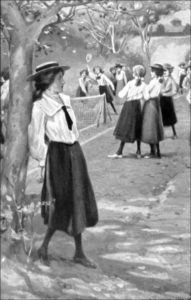
And then – beyond the mechanics of the plot – there are the relentless psychological dramas of friendships and feelings.
Brazil had a real gift for making raw emotions and complex psychology manageable. Her heroines suffer the extreme torments of emotion and yet – the trauma is resolved and life goes on in spite of all the drama, stress, and distress.
This is because Brazil girls are basically healthy and happy. They cheerfully scarf up buns and chocolate is a big feature; they don’t injure themselves beyond a scraped knee climbing down a cliff or over a rooftop; and they don’t obsess on their looks. They grow up in a different world.
Brazil, however, always goes to some lengths to describe the facial features of her heroines and there’s often nonsense about Celtic blood as a determinant of character. The books are loaded with all kinds of stereotypes and class prejudice. In that, they are of their unexamined place, time and class.
Brazil girls are resourceful problem solvers. With great ingenuity three girls smuggle in the makings of a surprise birthday feast in the dormitory. It’s wartime and this makes it even more difficult:
The three confederates undid their package, and gloated over its contents. The cake was quite a respectable one for war-time, to judge from appearances it had cherries in it, and there was a piece of candied peel on the top. The little boxes of Christmas-tree candles held half a dozen apiece, assorted colours. They took sixteen of them, sharpened the ends, and stuck them down into the cake.
“When it’s lighted it will look A 1,” purred Betty.
“How are we going to open the tin of condensed milk?” asked Sylvia.
“It’s one of those tins you prise up,” said Marjorie jauntily. “Give it to me. A penny’s the best weapon. Here you are! Quite easy.”
“Yes, but there’s another lid underneath. You’re not at the milk yet.”
Marjorie’s feathers began to fall. She was not quite as clever as she had thought.
“Here, I’ll do it,” said Betty, snatching the tin. “Take down a picture and pull the nail out of the wall, and give me a boot to hammer with. You’ve to go through this arrow point and then the thing prises up. Steady! Here we are!”
….
The confederates had decided to wait until the magic hour of midnight before they began their beano…. At eleven o’clock she heard Miss Norton walk along the corridor and go into her bedroom. After that no other sound disturbed the establishment, and Marjorie repeated poetry and even dates and French verbs to keep herself awake.
At last the clock chimed its full range and struck twelve times. She sat up and felt for the matches.
Betty and Sylvia, who had gone to sleep prepared, woke with the light, but it was a more difficult matter to rouse Irene. She turned over in bed and grunted, and they were obliged to haul her into a sitting position before she would open her eyes.
“What’s the matter? Zepps?” she asked drowsily.
“No, no; it’s your birthday party. Look!” beamed the others.
On a chair by her bedside stood the cake, resplendent with its sixteen little lighted candles, and also the tin of condensed milk. Irene blinked at them in amazement.
“Jubilate! What a frolicsome joke!” she exclaimed. “I say, this is awfully decent of you!”
“We told you you’d wake up in better spirits, old sport!” purred Marjorie. “I flatter myself those candles look rather pretty. You can tell your fortune by blowing them out.”
“It’s a shame to touch them,” objected Irene.
“But we want some cake,” announced Betty and Sylvia.
….
Everybody agreed that the cake was delicious. They felt they had never tasted a better in their lives, although it was a specimen of war-time cookery.
“I wish we could have got some cocoa,” sighed Betty. “I tried to borrow a little and a spirit lamp from Meg Hutchinson, but she says they can’t get any methylated spirit now.”
“Condensed milk is delicious by itself,” suggested Sylvia.
“Sorry we haven’t a spoon,” apologized Marjorie.
For lack of other means of getting at their sweet delicacy the girls dipped lead-pencils into the condensed milk and took what they could.
“It’s rather like white honey,” decided Betty after a critical taste. “Yes—I certainly think it’s quite topping. It makes me think of Russian toffee.”
“Don’t speak of toffee. We haven’t made any since sugar went short. Jemima! I shall eat heaps when the war’s over!”
“You greedy pig! You ought to leave it for the soldiers.”
“But there won’t be any soldiers then.”
“Yes, there’ll be some for years and years afterwards. They’ll take some time, you know, to get well in the hospitals.”
“Then there’s a chance for me to nurse,” exclaimed Marjorie. “I’m always so afraid the war will all be over before I’ve left school, and——”
“I say, what’s that noise?” interrupted Irene anxiously. “If the Acid Drop drops on us she’ll be very acid indeed.”
For reply, Marjorie popped the condensed milk tin into her wardrobe, blew out the candle, and hopped into bed post-haste, an example which was followed by the others with equal dispatch. They were only just in time, for a moment later the door opened, and Miss Norton, clad in a blue dressing-gown, flashed her torchlight into the room. Seeing the girls all in bed, and apparently fast asleep, she did not enter, but closed the door softly, and they heard her footsteps walking away down the corridor.
“A near shave!” murmured Marjorie. – A Patriotic School Girl (1917)
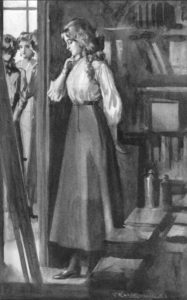
The settings – small close-knit communities with strict hierarchy and codes of convention allows for the thrills spills, miseries and delights of adolescence to be played out as predictable drama.
There will be misunderstandings and teachers will misjudge the character of the protagonist. A conversation will be overheard. A secret disclosed. False accusations made.
There will be competition for popularity and – before the novel comes to its satisfying end – there will usually be some adventure involving physical danger and a drama around a school play or performance.
And there will be transgressions. Always transgressions because Brazil girls are full of adventure, mischief and impetuous high spirits.
Fortunately Brazil avoids the overt moralizing that characterized many of the stories for children and adolescents. in her era and earlier. Her novels are no Eric,or Little by Little stories of misery, cruelty and degradation nor are they merely sentimental. Her characters get into real trouble and life threatening situations through impulsively and a sense of adventure. They escape them through courage and resourcefulness. Pluck. And a dollop of luck.
Girls! Girls everywhere! Girls in the passages, girls in the hall, racing upstairs and scurrying downstairs, diving into dormitories and running into classrooms, overflowing on to the landing and hustling along the corridor—everywhere, girls! There were tall and short, and fat and thin, and all degrees from pretty to plain; girls with fair hair and girls with dark hair, blue-eyed, brown-eyed, and grey-eyed girls; demure girls, romping girls, clever girls, stupid girls—but never a silent girl.
 That’s the opening of The School by the Sea (1914). These rampaging, noisy, cheerful, boisterous girls. They are lucky to be at The Dower House under the firm kind eye of headmistress Miss Birks.
That’s the opening of The School by the Sea (1914). These rampaging, noisy, cheerful, boisterous girls. They are lucky to be at The Dower House under the firm kind eye of headmistress Miss Birks.
“Let them fizz, poor dears!” said Miss Birks, smiling to herself as a special outburst of mirth was wafted up from below. “It does them good to work off steam when they arrive. … what a noise! It seems almost sacrilege in an old convent.”
The setting is classic Brazil – a C14th century former convent on a clifftop promontory in Cornwall. Brazil had a great interest in local history and antiquity as well as a deep appreciation of the countryside and nature. Indeed, she bought a 38 acre stretch of coastline near a second home in Polperro to save it from development and bequeathed it to The National Trust. She also believed in fairies and pixies but that’s story for another time.
It’s an ideal school with an ideal head and an idyllic setting.
They were a very happy little community at the Dower House. They admired and respected their headmistress, and her well-framed rules were rarely transgressed. Certainly the girls would have been hard to please if they had not been satisfied with Miss Birks, for allied to her undoubted brain power she had those far rarer gifts of perfect tact and absolute sympathy. She thoroughly understood that oft-time riddle, the mind of a schoolgirl, and, while still keeping her authority and maintaining the dignity of her position, could win her pupils’ entire confidence almost as if she had been one of themselves.
“Miss Birks never seems to have quite grown up. She enjoys things just the same as we do,” was the general verdict of the school.
Perhaps a strain of Irish in her genealogy had given the Principal the pleasant twinkle in her eye, the racy humour of speech, and the sunny optimistic view of life so dearly valued by all who knew her. Anyhow, whatever ancestry might claim to be the source of her cheery attributes, she had a very winning personality, and ruled her small kingdom with a hand so light that few realized its firmness. And a kingdom it was, in the girls’ opinion—a veritable “kingdom by the sea”. No place in all the length and breadth of the British Isles, so they considered, could in any way compare with it.
The isolated setting allows the girls considerable freedom and independence, extraordinary scenery and access to clifftops and beaches.
It held the most delightful of narrow coves, with gently shelving, sandy beaches—ideal bathing places in summer-time—and mysterious caverns that might occasionally be explored with a candle, and interesting pools among the rocks, where at low tide could be found seaweeds and anemones, and crabs and limpets, or a bestranded starfish. On the steep cliffs that rose sheer and jagged from the green water the seabirds built in the spring; and at the summit, on the very verge of the precipice, bloomed in their season many choice and rare wild flowers—the lovely vernal squill, with its blossoms like deep-blue stars; the handsome crimson crane’s-bill; the yellow masses of the “Lady’s fingers”; the pink tufts of the rosy thrift; or the fleshy leaves of the curious samphire.
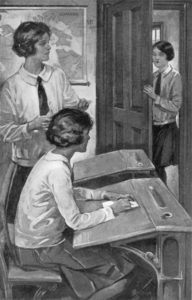
This is no cloistered world of silent nuns.
No pale-faced novices these, with downcast eyes and cheeks sunken with fasting; no timid glances, no soft ethereal footfalls or gliding garments—the old order had changed indeed, and yielded place to a rosy, racy, healthy, hearty, well-grown set of twentieth-century schoolgirls, overflowing with vigorous young life and abounding spirits, mentally and physically fit, and about as different from their mediaeval forerunners as a hockey stick is from a spindle.
Educational Theory, Leadership and School Change
It may be perverse to think of looking for school change and educational reform in popular school stories from over a century ago. But – there it is!
Like many of the headmistresses in the novels Miss Birks is very modern in her educational outlook.
Dearly as she valued the fourteenth-century origin of her establishment, Miss Birks did not sacrifice comfort to any love of the antique. Inside the ancient walls everything was strictly modern and hygienic, with the latest patterns of desks, the most sanitary wall-papers, and each up-to-date appliance that educational authorities might suggest or devise. Could the Grey Nuns have but returned and taken a peep into the well-equipped little chemical laboratory, they would probably have fancied themselves in the chamber of a wizard in league with the fiends of darkness, and have crossed themselves in pious fear at the sight of the bottles and retorts; the nicely-fitted gymnasium would have puzzled them sorely; and a hockey match have aroused their sincerest horror.
And Angela Brazil even goes into a bit of moralizing about a new golden age of social change and girls education:.
Tempora mutantur, nos et mutamur in illis—”the times are changed, and we are changed with them!” Though we have lost something of the picturesqueness of mediaeval life, the childlike faith of a childlike age, the simplicity of a nation only groping to feel its strength, we have surely gained in the long years of growth, in the gradual awakening to the thousand things undreamt of by our forefathers, and can justly deem that our lasses have inherited a golden harvest of thought and experience from those who have trod before them the thorny and difficult pathway that leads to knowledge.
A little later we read that Miss Birks is invested in professional development, attends educational conferences and believes in learning by doing.
Hands-On Learning and Personalized Experiential Learning
Progressive schools often like to claim that there are no back seats in a classroom where everyone is engaged and active. And so it was at Dower.
Miss Birks often congratulated herself on the fact that the smallness of her school allowed her to give a proportionately large amount of individual attention to her pupils. There was no possibility at the Dower House for even the laziest girl to shirk lessons and shield her ignorance behind the general bulk of information possessed by the Form. Backward girls, dull girls, delicate girls—all had their special claims considered and their fair chances accorded. There was no question of “passing in a crowd”. Each pupil stood or fell on the merits of her own work, and every item of her progress was noted with as much care as if she were the sole charge of the establishment. Miss Birks had many theories of education, some gleaned from national conferences of teachers, and others of her own evolving, all on the latest of modern lines. One of her pet theories was the practical application, whenever possible, of every lesson learnt. According to the season the girls botanized, geologized, collected caterpillars and chrysalides, or hunted for marine specimens on the shore, vying with each other in a friendly rivalry as to which could secure the best contributions for the school museum.
Geography learned through field trips and active learning was her specialty:
Every variety of physical feature was examined in the original situation, so that watersheds, tributaries, table-lands, currents, and comparative elevations became solid facts instead of mere book statements, and each girl was taught to make her own map of the district.
Leadership and School Expansion
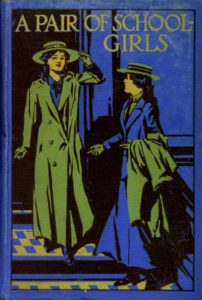 The Dower House was small – 20 students. By contrast Avondale College is unusually large for a Brazil school. That novel A Pair of School Girls (1912) novel opens after a summer of building expansion, growth and change
The Dower House was small – 20 students. By contrast Avondale College is unusually large for a Brazil school. That novel A Pair of School Girls (1912) novel opens after a summer of building expansion, growth and change
Three hundred and eighty-seven pupils had assembled that morning in the great lecture hall, the largest number on record at the College; five additional classes had been formed, and there were six extra mistresses.
This school is bursting with school spirit and thriving! This is attributed to good leadership and a school vision and mission.
And just look at the progressive curriculum (this is pre WW1 remember – times we often choose to think of as educational dark ages.) The school even has something of a democratic spirit and a measure of student leadership.
Avondale College was a large day school. Its pupils were drawn from all parts of Coleminster and the surrounding district, many coming in by train or tramcar, and some on bicycles. Under the headmistress-ship of Miss Tempest its numbers had increased so rapidly that extra accommodation had become necessary; and not only had the lecture hall and dressing-rooms been enlarged, but an entire new wing had been added to the building.
School Spirit, a Diverse Curriculum, Democracy and Student Voice
Avondale prided itself greatly upon its institutions. It is not always easy for a day school to have the same corporate life as a boarding school; but Miss Tempest, in spite of this difficulty, had managed to inaugurate a spirit of union among her pupils, and to make them work together for the general good of the community. She wished the College to be, not merely a place where textbooks were studied, but a central point of light on every possible subject. She encouraged the girls to have many interests outside the ordinary round of lessons, and by the help of various self-governing societies to learn to be good citizens, and to play an intelligent and active part in the progress of the world. A Nature Study Union, a Guild of Arts and Crafts, a Debating Club, a Dramatic Circle, and a School Magazine all flourished at Avondale. The direction of these societies was in the hands of a select committee chosen from the Fifth and Sixth Forms, but in order that the younger girls might be represented, a member of the Upper Fourth was elected each year as “Warden of the Lower School”, and was privileged to attend some of the meetings, and to speak on behalf of the interests of the juniors. A Pair of School Girls (1912)
And in another modern and contemporary note, the election is tainted by malpractice.
 The novels are full of opportunities for, and examples of student leadership of all kinds. Girls put on plays and performances, they organize things, use their initiative and imagination, take charge and do responsible (and irresponsible) things outside the adult orbit.
The novels are full of opportunities for, and examples of student leadership of all kinds. Girls put on plays and performances, they organize things, use their initiative and imagination, take charge and do responsible (and irresponsible) things outside the adult orbit.
The leadership is of course a strictly recognized hierarchy and earned by seniority as well as ability. Here is Winifrede the head girl of Brackenfield College about to address the student body in A Patriotic School Girl (1918):
By five o’clock every girl in the school had assembled in the big hall. Though no mistresses were present, the proceedings were nevertheless perfectly orderly, and good discipline prevailed. On the platform sat the prefects, the chair being taken by Winifrede Mason, the head girl. Winifrede was a striking personality at Brackenfield, and filled her post with dignity.
Brackenfield is custom built and look at these modern facilities and appealing campus grounds. Throw in a wireless network and some pictures of photogenic students in safety goggles, poring over a microscope or building a robot and you could send out brochure for 2020-2021:
Brackenfield College stood on the hills, about a mile from the seaside town of Whitecliffe. It had been built for a school, and was large and modern and entirely up-to-date. It had a gymnasium, a library, a studio, a chemical laboratory, a carpentering-shop, a kitchen for cooking-classes, a special block for music and practising-rooms, and a large assembly hall. Outside there were many acres of lawns and playing-fields, a large vegetable garden, and a little wood with a stream running through it.
A carpentry shop? In a girls’ school? No surprise there.
My Aunt Olive who grew up on a clifftop farm right next door to a famous girls school – Roedean – was in domestic service all her life. She was born in 1895 and her first job was at Roedean where sweeping the sawdust and shavings in the carpentry shop was among her duties. She was 14 – the perfect age for a Brazil school girl. By the time of the 1911 census she was a live-in housemaid at the Norlandholme School on The Drive in Hove. But no hockey, tennis, Latin, maths and carpentry for her.

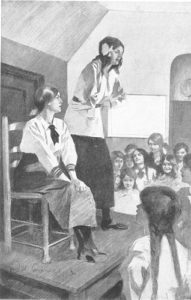
Student Voice
A large school is a state in miniature. Quite apart from the rule of the mistresses, it has its own particular institutions and its own system of self-government. In their special domain its officers are of quite as much importance as Members of Parliament, and wield an influence and an authority comparable to that of Cabinet Ministers. Tyrannies, struggles for freedom, minor corruptions, and hot debates have their places here as well as in the wider world of politics, and many an amateur “Home Rule Bill” is defeated or carried according to the circumstances of the case. At Briarcroft Hall there had hitherto existed a pure oligarchy, or government of the few. The Sixth Form had jealously kept the reins in their own hands, and, while granting a few privileges to the Fifth, had denied the slightest right of interference to the Lower School. So far, though the Juniors had grumbled continually, they had never taken any steps to redress their grievances. Here and there one of them would offer an indignant protest, which was treated with scorn by the Seniors, and things would go on again in the old unsatisfactory fashion.Gipsy, with the unbiased judgment of an entirely new-comer, had formed her opinion of the Briarcroft code, and deeming reform necessary, set to work to preach a crusade. She expounded her views to Hetty Hancock, Lennie Chapman, and a few other sympathizers, and organized a plan of campaign. (The Leader of the Lower School 1912)
Student power 1912 style. School revolution. Student voice and student agency lead school change.
School Change is in the Air
People who work in schools know that when a head of school attends a conference it is highly likely they will return with some hare-brained new scheme or idea and set about implementing it much to everyone’s annoyance.
Schools are conservative institutions and as a general rule have well-developed mechanisms to deal with such innovation and disruption however well intentioned and even necessary they may be. Most school personnel are experienced at managing such interference with the accepted order dictated by routine and common sense. They are adept at listening and quietly resisting all new fangled notions.
At Kingfield High School in Loyal the the School (1921) things are about to change although the head of school Miss Tatham is able to steer a moderate path between the extremes of tradition and modern reforms.
The fact of the whole matter was that Miss Tatham, the head mistress, had taken the opportunity during the holidays of attending an educational conference, where she had come in contact with very modern views and fresh schemes of school government. She had returned to Kingfield bristling with ideas, and anxious to test many various theories which had been aired at the meetings. She was a broad-minded woman, and able to steer successfully between being a crank or faddist on the one hand, or a “stick-in-the-mud” on the other. For some time she had been conscious that the school needed rousing up, and now that she had been shown the way she meant to use her opportunities. Loyal to the School (1921)
What she is to introduce is nothing less than an appreciation of cognitive diversity, an individualized curriculum, a strengths-based program, appreciation for the importance of the Arts and student electives. All with an emphasis on choice, commitment and personalized learning. I can think of a few schools that could do with leadership like that!
And – what’s more, in a move that school reformers would be wise to follow – she explains it all to the students and brings them into the thinking.
I have been thinking lately that we might with advantage try a new plan at school. You come here to be educated. Now, that does not mean simply to be crammed with facts, but to be taught the very best and highest possible way of self development. Certain facts must, of course, be mastered, and to learn them is a good discipline for training the mind, but the main point to be aimed at in education is to teach you a real love of intellectual things. I realize that tastes differ very much, and that what is an absorbing study for one girl may lack all interest for another. Life is not long enough to give time to everything, and it is better to concentrate our attention on certain things that appeal to our particular temperaments than to have a smattering of many ‘ologies. I have decided, therefore, to set aside two afternoons in the week for what I may call ‘self-expression’. There will be certain activities offered you, and you will each be allowed to choose which you wish to follow. I consider that two sides of our natures which need very careful training are the emotional and the mental. I am going to give an afternoon to each. Loyal to the School (1921)
This novel is jam-packed with radical educational thinking!. And radical definitions of what t means to be educated.
Oh my – this head of school went to the Glastonbury Music Festival over the summer and has returned to school full of news ideas about self expression, creativity, making and choice. Together with a healthy dose of serious commitment.
“By our emotional nature I mean that side of us which takes delight in art, music, and the drama. It shows itself early in very little children, who will often try to draw, sing, and act almost as soon as they can talk. If properly cultivated it is a most important part of self-expression. On one afternoon I am arranging to organize meetings in various branches of art, music, and acting. These are to be quite different and apart from your ordinary drawing or music lessons. You will work at what you wish, and in your own way, though an expert teacher will be there whom you can consult in any difficulty. I make one stipulation—that you must each choose your own subject for the term, and stick to it. I cannot allow chopping and changing. In the studio you will be given facilities for wood-carving, modelling, stencilling, painting, leatherwork, and other handicrafts. Those who wish to take up this branch must put down their names on the Arts List.
“Some of you, perhaps, may have no particular talent for what is called ‘creating in material’, that is, making beautiful objects in wood, leather, or clay, or with paints or pastels, but you can create in other ways. Beautiful sounds give as much pleasure as beautiful sights. I want us to revive the school orchestra and learn to play some good music. Those who can sing well are to be given a special opportunity of creation. This summer I went to the Glastonbury Musical Festival and heard one of the wonderful song-dramas which are produced there. A song-drama is a play which is both sung and acted, quite different from grand opera or musical comedy, and with a charm all its own. It corresponds in music to the Elizabethan or the Greek drama, for it is shown with scarcely any scenery, and on the simplest of stages, but its quality appeals to the very highest emotions. My hope is that we can get up a short song-drama for a Christmas performance, and that the orchestra should play the music for it. Those girls who can act, but not sing, will be given a separate opportunity to exercise their talents.
“Now, this is all on the emotional side of our natures, but we want also to cultivate the mental side. On our other ‘self-expression afternoon’ you will have a choice of various intellectual hobbies. We will have one department for studying nature, another for recording all the old legends and ancient customs of our city, a geographical society to trace our roads and streams, and a literary society for those who wish to try to write. Of course, you can’t belong to them all at once, and you must choose what you like the best, but I think in such a wide field of choice every girl will surely find something to suit her, which she can work at as ‘a labour of love’. The alternatives will be posted up in your form rooms, and you must put down your names by Friday afternoon, so that we can start next week. Don’t choose in too big a hurry, but take time to think it over—for once made you’ll have to abide by your choice.” Loyal to the School (1921)
But even this level of choice is not enough for our heroine Lesbia – a lifer who has attended Kingsfield for thirteen years. She is deeply loyal to the school and its academic expectations but she longs to be an artist. Changed financial circumstances mean that she must become a pupil teacher to pay the fees. This takes from her the choice time to pursue her art. But, loyal as ever, she does her best. She applies herself to her work and this gets the attention of her teacher Miss Pratt.
“I really believe, Lesbia Ferrars, you’re beginning at last to realize that a human head holds something called a brain,” she remarked pointedly one day. “Many girls seem to think learning is like receiving a phonographic impression. They reel it off again at exams, with as little intelligence as a gramophone. We don’t want the barrel-piano style of work in this form. We want cultivated brains that can reason as well as state facts, not bunglers who haven’t the sense to think.”
But Lesbia despairs of ever be allowed to have the time to pursue her art.
If her future was to consist of studying, passing exams, and afterwards teaching, Art would have little chance to develop.
“It’s a pity,” sighed Lesbia. “Because people work so much better at things they really and truly like. I hold with the Montessori system in that. If Miss Tatham gave me my choice I’d never look at Latin or Maths again. No! I’d just paint, paint, paint, from morning till night, and be absolutely happy. That’s my ideal of life. But I shall never get it—never! …. Oh dear! How I wish Kingfield High School was a school of art.”
“I’m an artistic peg in a scholastic hole,” she said to herself, rather pleased with her own simile….
“People may say what they like about brain culture, but let me use my hands!” she burst out impulsively.
“Here you are nearly sixteen and a half, and as childish as if you were six. If you won’t work and don’t pass your exams what’s going to happen to you? I suppose you know you’ll have to earn your own living? You can’t be anything of a teacher unless you get some proper qualifications.”
“Must I be a teacher?” asked Lesbia desperately. “Couldn’t I take up Art instead?”
“Art!” (Mrs. Patterson’s voice expressed a volume of scorn.) “Art! That’s the last thing in the world to depend upon. It’s a most precarious livelihood nowadays. Why it would probably be years before you could sell a picture. Now don’t be silly, Lesbia. Miss Tatham has been very kind in helping you, and you owe it to her and to the school to work your hardest. What’s the use of beginning to cry? Do wipe your eyes and be sensible.”
For one wild moment she wished herself out in Canada. Then some secret voice within her seemed to whisper.
“No! Be loyal to the school. You’ve stuck to it all these years, and if anybody can teach those juniors its best traditions surely you can! It’s a downright good opportunity.”
Lesbia resigns herself to her fate:
She had anchored herself fast to the Kingfield High School, and, according to Mrs. Patterson, she might consider herself extremely lucky to have the chance of continuing there at all. She must make the best of it. That was the only thing to be done. She washed her face, ate her supper, and, seeing her pile of books on the tray, made a really creditable effort to prepare some of her lessons, but her head ached, and the letters danced about on the pages.
There’s a genius new girl at Kingsfield too, but this one is not a prig.
“She’s queer, of course, but in a way she’s rather a sport,” declared Kathleen, discussing the new-comer in the cloakroom….
She would finish her mathematical problems in a few minutes, while her schoolmates were still staring at them, and would sit with arms folded and answers ready when the rest of the form were helplessly beating their brains. She saw at once that it gave offence, and apologized in her abrupt manner.
“I can’t help it. I just see the answers somehow and write them down.”
Couldn’t you fiddle about with your pencil and look as if you were still working?” urged Calla’s injured voice. “It makes Miss Pratt on the warpath to see you sitting up so soon. She said, ‘Aren’t you finished yet, girls?’ this morning, very acidly. I think you might try to spin things out for our sakes.”
In the matter of memorizing, also, Regina’s nimble brains utterly outdistanced those of her companions. She took home the history book and read up all the portions which Va had taken during the two previous terms, proving a far better acquaintance with it at revision classes than the rest of the form, and bringing out dates with enviable accuracy.
“I can’t help it,” was still her protest. “It’s as easy to remember a right date as a wrong one. They stick in my head somehow. If I see them once I know them.”
“You’re a genius, I suppose,” sighed Kathleen. “There ought to be a special form for geniuses. It’s not right to wedge them in amongst ordinary girls.”
But Regina is not an ordinary girl and she takes a real shine to Lesbia.
There was not very much reserve about Lesbia. If she took a fancy to anybody her heart blossomed like a mango in an Indian conjurer’s trick, and she was ready to impart any number of secrets.
Brazil always liked to dwell on the facial and physical features of her characters and here she also mixes in a dose of her classic nonsense about Celtic heritage.
(Regina’s) face was too strongly cut for mere prettiness, but her great grey eyes seemed to hold whole past lifetimes of though in them. In manner she was very abrupt. She snapped out her remarks in short jerks, as if she were firing them from a gun. She moved with the self-consciousness often noticed in girls of sixteen. The whole of her atmosphere was intensely “mental”. Astrologers would have placed Mercury and Jupiter for her birth signs. Her brains were so big that she almost seemed intellectual against her will. She did not want to pose as clever, and curiously enough seemed to covet most all the specially feminine characteristics which she rather conspicuously lacked. She admired Lesbia, much as a boy would, for her pretty hair, her dainty movements, and the general Celtic glamour that hung about her; she behaved, indeed, more like a youth in love than an ordinary schoolgirl chum. Her large soulful eyes would gaze at her idol during classes as if she were composing sonnets, and she haunted her round the school till the girls christened her “Lesbia’s shadow”.
Head of School Emergency
It’s hard work being head of school and
The Christmas term-end festivities tired Miss Tatham out. For a long time she had not been strong, and had been struggling to keep up with the hundred and one duties expected from the principal of a big school. During the holidays she collapsed, and her doctor insisted upon several months’ entire rest. The governors of the school, called in committee to face the sudden emergency, appointed a locum tenens to rule in her stead for a term
Leadership Change and a New School PDA (Public Display of Affection) Policy
Miss Ormerod, who thus came in a hurry to fill up the gap, was a B.A., and had had high school experience—too much so, the girls decided after a few days of her acquaintance. She was one of those people who are clever, but tactless. She had passed any number of examinations with flying colours, but had no knowledge of human souls. From the very first she set everybody’s bristles rising. The teachers, accustomed to Miss Tatham’s personal magnetism, were put out by abrupt criticisms and lack of consideration, while the girls declared that a gorgon had been sent to reign over them. Miss Ormerod, to do her strict justice, was hardworking and conscientious. She never spared herself. It was a difficult post, and she filled it according to her own lights. If she found what she judged slackness she was doing her duty to correct it. But between a “wise administrator” and a “jack-in-office” there is all the difference in the world. Some women love power, and exercise it unmercifully. Woe betide the lesser planets that are forced to circle in their orbits.
The girls grow restless and grumble under the yoke of the new regime:
“Miss Tatham never made any silly rules about not talking in the hall,” declared Kathleen indignantly, coming into the Sixth Form room smarting from a sharp rebuke and confiding her woes to a sympathetic circle.
“No! It’s perfectly ridiculous. We must talk somewhere, I suppose.”
“We shall be having ‘Silence’ in the cloakroom next.”
“Or in the playground.”
“I wish darling Tatie was back.”
“You didn’t call her ‘darling’ when she was here.”
“Well, I do now.”
“Let’s write her a round-robin and say we wish she was back and we detest Miss Ormerod,” suggested Marion impulsively.
“No! No! That would spoil her holiday. The doctor said she wasn’t to have any worry.”
Miss Ormerod has her own educational theories and she sets about putting them into practice much to the to the great consternation of the girls.
She particularly waged war against what she termed “sentiment”. She objected to seeing girls walking about the playground with their arms round each other’s waists, or to the display of any affection. She called such behaviour “early Victorian”, and spoke of it with contempt. During the war she had taken the place of a junior master at a boys’ grammar school, and her ideal was that girls should exhibit their feelings as little as their brothers. She made a new rule that recreation time must be spent in definite games, and that nobody was to be allowed to lounge about the playground or gymnasium and chat.
The headmistress of Brackenfields (A Patriotic School Girl ) took a whole different view of such friendships and displays of affection:
Mrs. Morrison considered schoolgirl friendships highly important and likely to last for life. She beamed rather than frowned on those who walked arm in arm.
Miss Ormerod’s new school rules are met with fierce opposition and the cause of much animated outrage in the cloakrooms:
“I never heard such nonsense in all my life.”
“Mayn’t take each other’s arms, indeed.”
“What would happen if I kissed anybody?”
“Oh, you’d get reported!”
“Kissing’s called ‘unhealthy’, if you please.”
“Oh, indeed, is it? I thought ‘Any time was kissing time’.”
“Don’t tell Miss Ormerod so, that’s all.”
“Why shouldn’t we walk round the gym and talk?”
“We’re supposed to be learning to gossip.”
“What is gossip?”
“Ask me a harder.”
“Miss Tatham never said we weren’t to have chums.”
“Oh, but she was sensible!”
“Miss Ormerod’s just a crank.”
“It’s too bad her coming and upsetting all our ways.”
“I vote we don’t play any wretched old games.”
“We can’t be made to play when we don’t want to.”
And so they begin to rebel and resist and work to rule and do the minimum. It becomes fashionable to be a slacker and shirker. And this means that Lesbia – a prefect – is in a dilemma. Miss Tatum responds to a postcard from her rest home in Torquay:
“I hope to come back after Easter, but meantime I trust you prefects to do all you can to make matters run smoothly. You in particular, Lesbia, as the oldest pupil, I ask to be ‘loyal to the school’, and to use your influence with the others. If I can feel that things are going on all right in my absence I shall get well twice as fast. Please tell that to the rest. I have not time to write to them all.”
Lesbia, who had been one of the principal shirkers at the hated game of rounders, pulled wry faces over the letter, but patted it in her pocket nevertheless.
“I’d do anything to please Miss Tatham,” she decided. “Yes, I guess I’ve got to be ‘loyal to the school’
And so she helps rally the troops, assert the responsible leadership of the older girls, and she saves the day.
But Miss Ormerod is not a total failure as a school leader
Girls and Athletics
Kingsfield is a city school and has no playing fields nearby. Teams have to travel by tram to a hockey pitch they rent in the suburbs. Miss Ormerod often goes to watch and on one occasion played in in a match “School versus Mistresses”, and astonished everybody by her agility. But she also has a developed theory about athletic policy and the importance of focussing on more than just the star athletes.
“You have to educate your best players,” she told the Games Committee, “I always say the strength of a school lies in its reserve teams. Every girl in the first team ought to have an understudy, then there’ll be no panic if she has suddenly to drop out for any reason. I’ve known matches ruined because schools hadn’t the sense to train their reserves properly.”
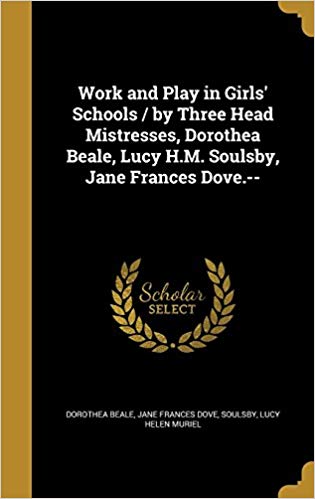 This below is from a serious book about education from that era Work and Play in Girls Schools (1898). One of the three authors – headmistresses – extolls the virtues of games in ways that go beyond health and exercise.
This below is from a serious book about education from that era Work and Play in Girls Schools (1898). One of the three authors – headmistresses – extolls the virtues of games in ways that go beyond health and exercise.
Games, however, have a much higher function to perform in school life than any I have yet mentioned. Here is a splendid field for the development of powers of organisation, of good temper under trying circumstances, courage and determination to play up and do your best even in a losing game, rapidity of thought and action, judgment and self-reliance, and, above all things, unselfishness, and a knowledge of corporate action, learning to sink individual preferences in the effort of loyally working with others for the common good.
The book has plenty of other wise advice about every aspect of school life and the curriculum. Yes – parts may seem quaint but this from the preface by Miss Beale remains true:
I would fain hope, that one day all teachers will endeavour to spend at least some time, before entering on professional work, in studying the art, the science, the philosophy of education.
Amen to that.
It’s a surprisingly wise book and full of sound and practical thinking on everything from the teaching of spelling to the importance of scheduling for quiet time. It ‘s about balance.
We do not desire girls to be brainless athletes any more than we wish that they should be delicate or stunted blue-stockings, and either of these exaggerated types is made doubly deplorable if, as sometimes happens, there is a deficiency of moral power
In Loyal to the School Lesbia has to learn to balance three competing loyalties – loyalty to the school; to the family that took her in as an infant orphan; and loyalty to her passion for art and her wish to become an artist. It’s a story of growing up, wrenching emotions and disappointments that moves inexorably towards a satisfying conclusion.
One of the best things about going back to Angela Brazil is the language. And if you’ve stuck with this post you will already have had a taste of the tribal slang and of her infinite number of alternatives to “said'”. And is was the slanguage of the novels that brought down on her the wrath of real world school headmistresses. And that is the topic of another post.
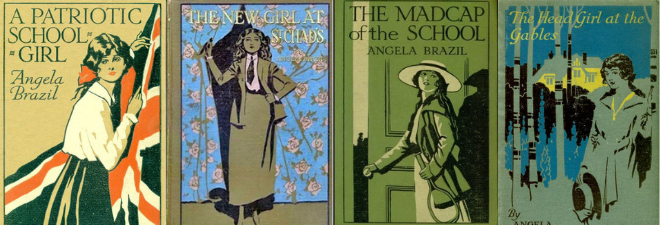
References:
The Novels of Angela Brazil
Gillian Freeman The Schoolgirl Ethic: the life and work of Angela Brazil.
Ju Gosling: The Virtual Worlds of Girls
Sara A,Burstall M.A.: English High Schools for Girls: Their aims, Organization and Management (1907)
Work and play in girls’ schools / by three head mistresses, Dorothea Beale, Lucy H.M. Soulsby, Jane Frances Dove (1898)
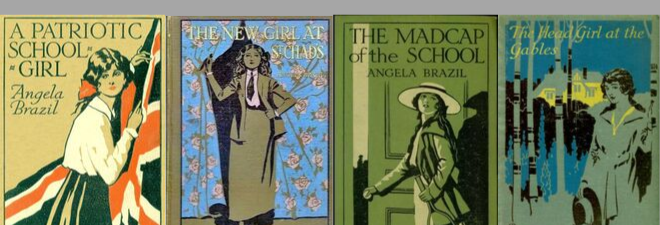


I’ve just found this post and spent a very happy and nostalgic 20 minutes taking a trip down memory lane! Thank you so much for sharing it on your blog. When I was about 12, a friend of my mother gave me all of her mother’s Angela Brazils – beautiful original copies, some of them with the jackets shown in this post. I read them all over and over and haunted second-hand book shops for additional copies to complete my collection. I’ve never read Loyal to the School, so must try and track that one down. It’s been fascinating to revisit the books in your blog post above and see them as progressive and forward-thinking because, of course, they seemed tremendously old fashioned to me as a young teen back in the early 1980s. I think I’ll have to spend some time with Angela over Christmas!
Thanks for the comment Annabel. It was my mother who suggested Brazil to me after I had read myself through all the series books at the library. They were old-fashioned even in her pre-war childhood. I was struck by how many of the education themes are with us today.
Wonderful post! I’ve heard of this author and have seen a few of the books in collectible shops, but have never read one of them. (I never knew about the Brazil vs. Brazzle issue:) Despite any possible shortcomings, the books sound charming. The illustrations are absolutely lovely!
They are period pieces that is for sure. With all the limitations that implies when it comes to issues of class and race. But the Brazzle/Brazil novels have a charm of their own – they create a girls’ world that is full of adventure and spirit. Thanks for the comment Becky. Please let me know what you think when you’re taken a look at some of them. Scooterons-nous vite!